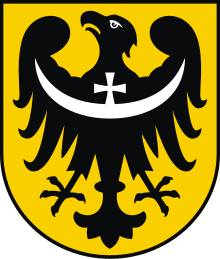The coat of arms of the Lower Silesian Voivodeship, Poland, features a black eagle with a white (silver) crescent put across its chest and wings, with a white (silver) cross pattée on its top, placed in a yellow escutcheon (shield). The first version of the coat of arms had been adopted in 2000, and current version, in 2009.
| Coat of arms of the Lower Silesian Voivodeship | |
|---|---|
 | |
| Armiger | Maciej Awiżeń, Voivode of the Lower Silesian Voivodeship |
| Adopted |
|
| Shield | Yellow (silver) Iberian-style escutcheon |
| Compartment | left-faced black eagle with a white (silver) crescent put across its chest and wings, with a white (silver) cross pattée on its top |
| Use | Lower Silesian Voivodeship |
Design
editThe coat of arms of the Lower Silesian Voivodeship consists of the yellow (golden) Iberian-style escutcheon (shield) with square top and rounded base. It features a left-faced black eagle, with a white (silver) crescent put across its chest and wings, with a white (silver) cross pattée on its top, in the centre of bird's chest. The eagle has a white (silver) eye, and raised wings.[1]
History
editBackground
editThe design of the coat of arms had been for the first time used by Henry II the Pious, duke of Wrocław and Greater Poland, and the High Duke of Poland. It was present in his seal, that was used from 1224 to 1240. It depicted an eagle with a crescent put across its wings, with a cross pattée on top of it, in its middle, placed on a shield. Such design was inspired by the seal used by Henry the Bearded, his father.[2]
Since then, the black eagle with a white (silver) crescent put across its wings, usually with a white (silver) cross pattée on top of it, placed in the yellow (golden) escutcheon (shield), had become the symbol of the Lower Silesia, including being the symbol of the Piast rulers of the Duchy of Silesia, and many of its successors.[2]
Legnica Voivodeship
editPrior to establishment of the Lower Silesian Voivodeship, within its current borders, from 1975 to 1998, existed the Legnica Voivodeship.[3][4]
Its coat of arms was established in 1997 and used until voivodeship disestablishment on 31 December 1998. It consisted of the wide Norman-style escutcheon, with square top and pointed bottom. It was divided vertically into two fields of equal size. The left field had a yellow (golden) background, and featured left half of a black eagle, from the coat of arms of Lower Silesia. It was on the coat of arms used by Louis II of Brieg, duke of Legnica and Brzeg, respectively from 1399, and 1413, until 1436. The eagle had a left half of a white (silver) crescent on its chest going alongside to the top of its raised left wing, with a left half of the white (silver) cross pattée placed on the top of the crescent, in the middle of the bird's chest. The left field featured a chequered pattern of eleven alternating white and red rectangles. The number of the rectangles referred to the eleven cities and towns in the voivodeship.[5]
Lower Silesian Voivodeship
editThe Lower Silesian Voivodeship was established on 1 January 1999.[4] Its first coat of arms had been adopted on 25 February 2000 by the Lower Silesian Voivodeship Sejmik. It consisted of the yellow (golden) Iberian-style escutcheon (shield) with square top and rounded base. It featured a left-faced black eagle, with a white (silver) crescent put across its wings, with a white (silver) cross pattée on its top, in the centre of bird's chest. The eagle had a white (silver) eye and raised wings.[1]
Following the negative opinion of the Heraldic Commission, the voivodeship had modified and simplified the design of the eagle charge featured in the coat of arms, with the new design being approved on 23 July 2009,[1] and officially established on 17 December 2009.[6][7]
See also
editReferences
edit- ^ a b c "W ministerstwie nasz orzeł dostał po łbie". wroclaw.wyborcza.pl (in Polish).
- ^ a b Alfred Znamierowski: Insygnia, symbole i herby polskie : kompendium. Warsaw: Świat Książki, 2003, p. 87. ISBN 83-7311-601-X.
- ^ Ustawa z dnia 28 maja 1975 r. o dwustopniowym podziale administracyjnym Państwa oraz o zmianie ustawy o radach narodowych., In: 1975 Journal of the Laws, no. 16, position 91..
- ^ a b Ustawa z dnia 24 lipca 1998 r. o wprowadzeniu zasadniczego trójstopniowego podziału terytorialnego państwa, In: 1998 Journal of the Laws, no. 96, position 603).
- ^ Legnickie z nowym herbem; In: Gazeta Chojnowska, 21 February 1997. Chojnów. ISSN 1234-9518.
- ^ "Dolny Śląsk ma herb i flagę". umwd.dolnyslask.pl (in Polish).
- ^ Resolution no. XXI/298/08 of the Lower Silesian Regional Assembly from 30 March 2001.